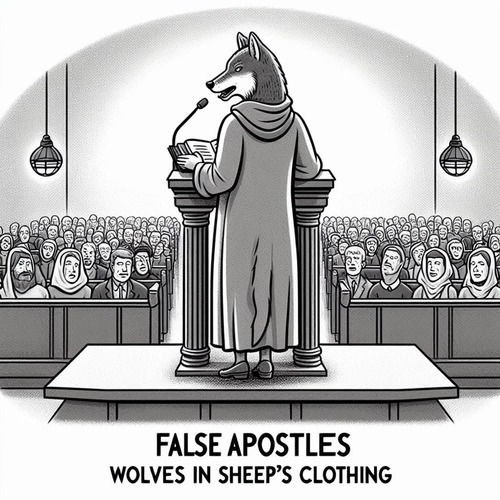Do All Religions Lead to the Same God?
**This post is part of our series “Satan’s Lies: Common Deceptions in the Church Today.”**
We hear it all the time: “All religions are just different paths up the same mountain.” Perhaps we’ve even felt its appeal. In an age that prizes tolerance above truth, this sounds like the ultimate act of compassion—affirming everyone’s spiritual journey, and offending no one.
But here’s the problem: this view, however well-intentioned, directly contradicts what Scripture clearly teaches. And increasingly, it’s a deception infiltrating the church itself. When we blur the lines between religions in the name of niceness, we don’t just compromise biblical truth—we rob people of the gospel that alone can save them.
JESUS LEAVES NO ROOM FOR ALTERNATIVES
Let’s start where we must: with Jesus’ own words. In John 14:6, Christ makes one of the most exclusive claims in religious history: “I am the way, and the truth, and the life. No one comes to the Father except through me.”
- Notice what Jesus didn’t say. He didn’t say “I am a way” or “I show a truth” or “I offer one life among many.” He said “THE way.” This isn’t the language of religious pluralism. It’s the language of singular, exclusive access to God.
- The door imagery in John 10:9 reinforces this: “I am the door. If anyone enters by me, he will be saved.” Not doors, plural. One door. One entrance. One way in.
- The early church understood this with crystal clarity. When Peter stood before the same religious authorities who’d crucified Jesus, he declared with unflinching boldness: “There is salvation in no one else, for there is no other name under heaven given among men by which we must be saved” (Acts 4:12). No wiggle room. No exceptions. No alternative names.
- Paul echoed this truth throughout his letters: “For there is one God, and there is one mediator between God and men, the man Christ Jesus” (1 Timothy 2:5). One mediator. Not many. Not several paths to the same destination.
- The Reformed tradition has faithfully preserved this exclusivity. The Westminster Confession (10.4) affirms that salvation comes only through Christ. The Reformers didn’t fight and die to defend Christ alone (solus Christus) because they were narrow-minded bigots. They did so because Scripture leaves no other option. This isn’t our preference—it’s God’s revelation.
THE PROBLEM THAT DEMANDS A SPECIFIC SOLUTION
Here’s why this matters: all religions claim to solve the human problem, but they don’t even agree on what the problem is.
Christianity diagnoses humanity’s core issue as sin—willful rebellion against a holy God. “All have sinned and fall short of the glory of God” (Romans 3:23). Our best efforts at righteousness are, in Isaiah’s graphic language, like “filthy rags” before God (Isaiah 64:6). We’re not sick people who need medicine; we’re dead people who need resurrection. We’re not lost people who need directions; we’re condemned criminals who need a pardon.
Other religions fundamentally misdiagnose the problem. Buddhism sees it as attachment and suffering. Hinduism sees it as ignorance and karma. Islam sees it as forgetfulness and disobedience to Allah’s law. These aren’t just different words for the same thing—they’re entirely different problems requiring entirely different solutions.
And here’s the crucial point: human religion represents man’s attempt to reach up to God. Christianity reveals God’s initiative to reach down to man. “While we were still sinners, Christ died for us” (Romans 5:8). We didn’t climb up; He came down.
The cross proves Christianity’s exclusivity. If other paths to God existed, then Jesus’ death was unnecessary—even absurd. Paul states this bluntly in Galatians 2:21: “If righteousness were through the law, then Christ died for no purpose.” Would God send His beloved Son to suffer crucifixion if alternatives existed? The very horror of the cross demonstrates there was no other way. As the old hymn says, “There was no other good enough to pay the price of sin.”
RELIGIONS CONTRADICT EACH OTHER
“But don’t all religions basically teach the same thing?” No. They don’t. Not even close.
Islam explicitly denies Jesus is God’s Son and denies He was crucified—the two central claims of Christianity. Hinduism teaches pantheism (all is God) and reincarnation. Buddhism was originally atheistic, denying a personal Creator entirely. These aren’t different languages describing the same mountain—they’re contradictory claims about the nature of ultimate reality.
Let’s apply basic logic. Christianity claims God is triune—three persons, one essence. Islam insists God is absolutely singular and that the Trinity is blasphemy. Both cannot be true. Either God is triune or He isn’t. If Christianity is right, Islam is wrong about God’s most fundamental nature. If Islam is right, Christianity worships a false god.
The law of non-contradiction still applies to theology. Two plus two cannot equal both four and five. Jesus cannot be both God incarnate and merely a prophet. Either He rose from the dead or He didn’t. Truth, by its very nature, excludes its opposite.
When we say “all religions lead to God,” we’re not being tolerant—we’re being illogical. We’re claiming contradictory statements about God’s nature, humanity’s problem, and salvation’s means are all somehow equally valid. That’s not open-mindedness; it’s intellectual incoherence.
LOVE COMPELS US TO SPEAK TRUTH
Does this sound harsh? Unloving? Arrogant?
Consider this: if you knew the bridge ahead was out, would you be loving to tell travellers all roads are equally safe? If you had the cure for a terminal disease, would compassion mean affirming all treatments work equally well?
Sharing the exclusive gospel isn’t arrogance—it’s desperation. We’re not claiming superiority; we’re beggars telling other beggars where to find bread. We didn’t discover this truth; it was revealed to us while we were God’s enemies (Romans 5:10).
Jesus Himself taught the exclusivity we proclaim. In Matthew 7:13-14, He warned: “Enter by the narrow gate. For the gate is wide and the way is easy that leads to destruction, and those who enter by it are many. For the gate is narrow and the way is hard that leads to life, and those who find it are few.” This isn’t our invention—it’s His instruction.
And if we truly believe other religions lead to God, the Great Commission makes no sense. Why did Jesus command us to “make disciples of all nations” (Matthew 28:19-20) if people are fine where they are? Why did Paul agonise in Romans 10:14, asking “How will they believe in him of whom they have never heard?” if hearing about Jesus isn’t necessary?
The exclusivity of Christ doesn’t diminish evangelism—it fuels it. People are lost, and we know the way home.
THE GLORY OF ONE WAY
The exclusivity of Christ isn’t Christianity’s embarrassment—it’s our glory. It means salvation doesn’t depend on our ability to climb, achieve, perform, or measure up. It depends entirely on what Christ has done.
Every other religion says, “Do this and live.” Christianity says, “It is finished.” Every other system puts the burden on us. Christianity announces the burden has been carried by Another. Every other path leads upward through human effort. Christianity reveals the God who came down. To us.
This is the lie Satan wants the church to believe: that exclusivity is unloving, that proclaiming one way to God is narrow-minded bigotry. But when we surrender biblical truth for cultural acceptance, we don’t just compromise doctrine—we withhold the very gospel dying people need to hear.
So let’s stand firm in this truth. God has provided one way because we needed one way. “For God so loved the world, that he gave his only Son, that whoever believes in him should not perish but have eternal life” (John 3:16).
One God. One mediator. One way. One gospel.
That’s not narrow-mindedness. That’s grace.
DO ALL RELIGIONS LEAD TO THE SAME GOD? RELATED FAQs
What about people who never hear the gospel? Are they automatically condemned? This is one of the most wrestled-with questions in Reformed theology. Scripture is clear that salvation comes only through Christ (Acts 4:12), but it’s also clear that God judges people according to the light they’ve received (Romans 2:12-16). Reformed scholar DA Carson emphasises that while we can trust God’s perfect justice and mercy, Scripture nowhere suggests people can be saved apart from Christ. The proper response to this question isn’t to soften the exclusivity of the gospel but to fuel our urgency in missions—people need to hear!
- Doesn’t claiming Christianity is the only true religion make us just as dogmatic as religious extremists? Not all exclusive truth claims are equal. Christianity’s exclusivity is based on what God has revealed, not on human pride or power. Reformed theologian Tim Keller points out a crucial distinction: Christianity claims exclusivity based on grace (salvation is God’s gift), while other exclusive religions base it on works (salvation is human achievement). Moreover, Christian exclusivity has historically produced mercy, hospitals, and human rights, because it’s rooted in a God who died for His enemies—quite different from extremism that kills for religious conformity.
- What about “anonymous Christians”—the idea that people in other religions might be saved without knowing Jesus explicitly? This concept, popularised by Catholic theologian Karl Rahner, has been firmly rejected by Reformed scholars. RC Sproul called it “theological wishful thinking” that contradicts Romans 10:9-14, where Paul insists people must confess Jesus as Lord and believe in their hearts. Sinclair Ferguson notes the “anonymous Christian” theory essentially makes Christianity about general sincerity rather than specific faith in Christ’s finished work. Scripture never hints people can be saved by Jesus without knowing about Jesus—that’s why Paul risked his life to preach the gospel to those who’d never heard. Also, why would Scripture mandate us to share the gospel if people could be saved without it?
Aren’t Christians being hypocritical by claiming truth while borrowing from other cultures and philosophies? There’s an important difference between learning from common grace and syncretizing the gospel. Reformed theology has always distinguished between general revelation (truths about God available to all through creation and conscience) and special revelation (salvific truths available only through Scripture). Kevin DeYoung explains that Paul could quote pagan poets (Acts 17:28) because even broken clocks are right twice a day—all truth is God’s truth. But borrowing philosophical concepts or cultural insights is vastly different from claiming other religions provide salvation. We can appreciate Islamic architecture or Buddhist mindfulness practices while still insisting Jesus is the only Saviour.
- How do we respond to the claim that Christianity is just “true for you” but not universally true? This is postmodern relativism dressed in spiritual language, and it collapses under its own weight. As Reformed apologist John Frame points out, the statement “truth is relative” is itself a universal truth claim—it’s self-refuting. Jesus didn’t say “I am the truth for people in Palestine in the first century”—He said “I am the truth” (John 14:6). Christianity makes historical, verifiable claims: Jesus either rose from the dead or He didn’t. That’s not opinion or personal preference; it’s factual reality. Michael Horton observes that reducing Christianity to “what works for me” actually insults other religions—they make universal truth claims too, and they deserve to be taken seriously enough to be either believed or rejected, not patronized.
- What’s the Reformed view on “inclusivism”—the idea that Christ saves people through other religions? Inclusivism, championed by some evangelicals, suggests Christ’s work on the cross might save sincere seekers in other religions who never explicitly trust in Him. Reformed theologians like JI Packer and Michael Horton have strongly opposed this as biblically untenable. Packer argues inclusivism guts missions of urgency and contradicts the explicit “faith comes by hearing” principle in Romans 10:17. If people can be saved through sincere practice of other religions, why did Jesus command the Great Commission? Horton adds that inclusivism ultimately makes sincerity the grounds of salvation rather than Christ’s work—a return to works-righteousness by the back door.
How can we share Christianity’s exclusive claims with gentleness and respect? The key is remembering we’re not defending our achievement but announcing God’s grace. Reformed pastor Alistair Begg suggests starting with humility: “I’m not better than you; I’m a beggar who found bread and wants to share where the bakery is.” Timothy Keller models this beautifully, showing biblical exclusivity actually creates a level playing field—no one gets to God through moral superiority, ethnic heritage, or religious performance. We all need the same grace. The most respectful thing we can do is tell people the truth about their danger and God’s rescue plan, just as we’d warn someone about a washed-out bridge ahead. True love risks offense for the sake of salvation.
DO ALL RELIGIONS LEAD TO THE SAME GOD? OUR RELATED POSTS
Editor's Pick

Why Do People Hate the Doctrine of Election?
…WHEN THEY REALLY SHOULDN’T Few Bible doctrines provoke stronger reactions than election. The idea that God chose some for salvation [...]

The Doctrine of Providence: Does God Really Govern All Things?
You’re sitting in the doctor’s office when the diagnosis lands like a thunderclap. Your mind races: Why this? Why now? [...]

No Decay, No Defeat: What It Means That Christ’s Body Saw No Corruption
On the Day of Pentecost, Peter stood before thousands and made a startling claim: David's body decayed in the tomb, [...]
SUPPORT US:
Feel the Holy Spirit's gentle nudge to partner with us?
Donate Online:
Account Name: TRUTHS TO DIE FOR FOUNDATION
Account Number: 10243565459
Bank IFSC: IDFB0043391
Bank Name: IDFC FIRST BANK






